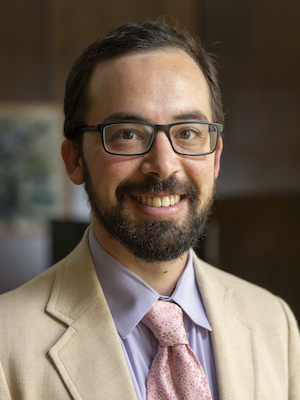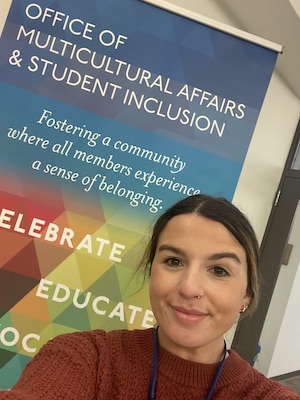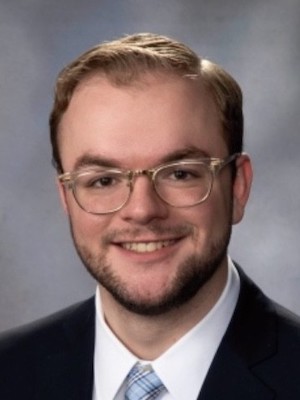Far from asking students to fend for themselves with little oversight, the mentoring and self-reflection at the core of student practicums in the School of Education’s M.S. in Higher Education program give students the tools to understand the college workplace—and to help transform it to be more student and learning-centered.
“From beginning to end of the practicum, we push students to model core tenets of our program, especially social justice, equity, student success, and the professional competencies required of the student affairs profession,” explains Professor Cathy Engstrom, Chair of the Higher Education program.
Program faculty place students in units such as residential life, academic advising, intercollegiate athletics, and multicultural affairs, across Syracuse University and with local partners ranging from SUNY College of Environmental Science and Forestry, to Le Moyne College, to Upstate Medical University.
Under the leadership of Professor Dawn Johnson, at the start of the practicum students explore potential assignments through a round robin practicum fair. Once their assignment is confirmed, students develop a learning contract with their supervisor, much like a job description negotiation. When it concludes, they participate in a performance appraisal that includes a meeting with their supervisor, written performance reviews, and a summary report.
In between, students gain a broad understanding of the higher education workplace—its policies, staffing, culture, even budgets—and learn how to listen to, develop relationships with, and advocate for students, particularly those from marginalized backgrounds. They are also expected to highlight policies and practices enhance or create barriers to student success.
Critical reflection about their own performance and practice is key. “We regularly ask students to reflect on their site’s organizational culture, espoused versus enacted values, and climate. Students analyze what they are learning and recognize the benefits of using peers to seek confidential advice about workplace issues,” says Engstrom. “Let’s face it, we always need workplace soulmates we can trust to get through challenging situations.”
As part of this reflection, we got to know five HED students during their spring 2023 placements, asking them why they chose this career path and what the practicum is teaching them.
 Robbie Opalecky G’24
Robbie Opalecky G’24
- Hometown: Hawley, PA
- Bachelor’s Degree: Environmental Biology from SUNY-College of Environmental Science and Forestry
- Activities/Hobbies: I like hiking and spending time outdoors or relaxing and watching TV and playing video games with friends.
What drew you to the M.S. in Higher Education?
While working as a temporary staff member in the SUNY-ESF residence hall, I fell in love with student affairs. I worked with a practicum student in this position, and she told me about SOE’s Higher Education program. As a SUNY-ESF graduate, I was familiar with SU, so the decision to stay for a two-year program was easy.
What are your current responsibilities?
In SU’s Center for Learning and Student Success (CLASS) most of my responsibilities are related to academic integrity. I grade the Academic Integrity Seminar to which students found in violation of the policies are assigned, and I offer them help on revising answers. I also serve as a Maximize Your Learning leader.
What do you hope to do once you graduate?
When I applied, I wanted to go into residence life. After my graduate assistant position in Fraternity and Sorority Affairs and my CLASS practicum, my future is a little less clear—I want to work in student affairs, but I am still trying to figure out the exact area.
How is this program helping you to effect change and enact critical reforms in higher education?
This program is opening my eyes to the experiences of students who identify differently than I do and inequities in higher education. I plan to do my best to reduce and hopefully remove some of these inequities.
 Melisa Larranaga G’24
Melisa Larranaga G’24
- Hometown: Perris, CA
- Bachelor’s Degree: B.S. in Agricultural Science and Education from California State University-Chico
- Activities/Hobbies: I enjoy reading, nature walks, and relaxing by watching shows and movies.
What drew you to the M.S. in Higher Education?
Through my undergraduate experiences, I realized I wanted to pursue a career that allowed me to be a supportive resource for students on a college campus.
What are your current responsibilities?
At SU’s Stevenson Educational Center, I meet one-on-one with student athletes to assist them in their college academic skill development.
What do you hope to do once you graduate?
To work in first-year experience programs, academic advising, or student support services.
How is this program helping you to effect change and enact critical reforms in higher education?
We have learned about challenges that each student may face in an institution. The work we do in our classes allows us to think critically about ways we can support students in getting past those challenges.
 Ariel Gratch G’24
Ariel Gratch G’24
- Hometown: Huntington Beach, CA
- Degrees: B.A in Theatre from Kennesaw (GA) State University; M.A. in Communication Studies from University of North Carolina-Chapel Hill; Ph.D. in Communication Studies from Louisiana State University
- Activities/Hobbies: I enjoy storytelling, woodworking, reading sci-fi/fantasy, and helping my seven-year-old figure out who he wants to be in the world.
What drew you to the M.S. in Higher Education?
The faculty are all critically minded. They push students to consider why a career in higher education is important for us and to find ways to support students we work with. As a current faculty member at Utica University, I enrolled so I can better serve our students and my institution.
What are your current responsibilities?
I’m working in the First-Year Dean Program at Le Moyne College. I assist students who are on academic probation, conduct workshops for student leaders, and help them organize events.
What do you hope to do once you graduate?
Continue the work I’ve been doing at Utica, especially as it relates to TRIO and first-generation students, as well as build more bridges between student affairs and faculty.
How is this program helping you to effect change and enact critical reforms in higher education?
I have been drawn to issues around student retention, especially as it relates to first-generation students and those who may have experienced trauma. This program has helped me build stronger relationships, made me a better mentor to TRIO students, and helped me get students resources they need to persist. It also helped me complete research, such as “The Haunted Classroom” published in Departures in Critical Qualitative Research.
 Rachel Allen G’24
Rachel Allen G’24
- Hometown: Syracuse, NY
- Bachelor’s Degree: Political Science and Global and International Studies with a minor in Spanish from SUNY-Oswego
- Activities/Hobbies: I like crossword puzzles, walking by the lake, learning how to crochet, and hand lettering.
What drew you to the M.S. in Higher Education?
As an undergrad, I loved the collegiate environment, and I want a career that allows me to stay in that space and make connections with students.
What are your current responsibilities?
In Multicultural Affairs and Student Inclusion at Upstate Medical University, I do outreach work for the Syracuse City School District, work on Accepted Student Days, and interact with students who engage with MASI (multicultural affairs and student inclusion) programs.
What do you hope to do once you graduate?
I always wanted to be faculty in either political science or history—and I still might. My interests in student affairs right now lie in admissions, educational opportunity, and advising and mentorship.
How is this program helping you to effect change and enact critical reforms in higher education?
We learn a lot about the barriers to education and how higher education can become more inclusive and equitable. Even in my first year, I have learned how to come up with initiatives that allow students to gain access to higher education and to persist toward getting their degree and developing valuable skills, no matter their educational journey.
 Jordan Signor G’24
Jordan Signor G’24
- Hometown: Watertown NY
- Bachelor’s Degree: B.A. in English Literature from Le Moyne College
- Activities/Hobbies: I enjoy reading, guitar, golf, and tennis.
What drew you to the M.S. in Higher Education?
My interest in student affairs started while on student government at Le Moyne College.
What are your current responsibilities?
At SOE’s Office of Academic and Student Services, I meet with students in an academic advisor capacity to help them succeed and to learn about the undergraduate admissions process.
What do you hope to do once you graduate?
I hope to work in admissions. I was able to connect with the central admissions office at Syracuse, and I appreciate how much they have been able to teach me in such a short time.
How is this program helping you to effect change and enact critical reforms in higher education?
The program has made me a better resource for students. My professors strongly emphasize the barriers that are still present throughout higher education and how we can implement healthy practices to take them down.
Learn more about the master’s degree in Higher Education, or contact SOE Graduate Admissions at soeadmissions@syr.edu.
